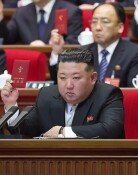Ambiguous Labor Laws and Inconsistent Government
Ambiguous Labor Laws and Inconsistent Government
Posted July. 21, 2007 03:03,
The Seoul Metropolitan Police Agency arrested 168 E-Land union members who were staging a protest at New Core Department Store in Gangnam, and at the Homever outlet in Sangam-dong, at 9:40 a.m. July 20, one hour after it dispatched 7,000 policemen to the sites.
When police broke into the outlets, union members resisted arrest by folding their arms and lying on the floor, resulting in scuffles between police and the protesters. Lawmakers Kwon Yeong-gil, Roh Hoe-chan, Sim Sang-jeong, and Cheon Yeong-se from the progressive Democratic Labor Party who had been at the outlets since Thursday night strongly protested against the crackdown.
The police will prosecute all the protesters arrested for disrupting business operations. Meanwhile, members of the Korean Confederation of Trade Unions protested against the police crackdown at two Homever outlets in Ulsan and Siheung, which disrupted business temporarily. The KCTU decided to impose a boycott against E-Land products in response.
The aftereffects of the protest are expected to persist-
E-Land estimates that it suffered a loss of tens of billions of won because of the strikes which lasted for 21 days. An E-Land spokesman said, The two outlets will resume business three to four days later after fixing the damaged facilities.
Though most of the E-Land unionists, including leading members, were arrested, it is expected that management and labor will reach a compromise soon. Hong Yoon-gyeong, the new leader of the union, made it clear on the same day that the union would negotiate with the company.
Choi Seong-ho, PR director at E-Land, also said, We will keep the promises we already made and continue to talk with the new leaders. But the company would not withdraw an indemnity file against the union, though he said it would ask the police to show leniency to employees who participated in the strikes.
As the E-Land union plans to continue its protests by joining forces with the KTCU, the conflict between management and labor is likely to continue.
The Ministry of Labor announced, With a third party taking part in the protests, the government cannot do anything else but deploy the police in order to prevent situations from spinning out of control. However, the government is being blamed for worsening the situation by showing inconsistent responses to the strikes.
Initially, Labor Minister Lee Sang-su put pressure on the company, saying, E-Land is hurriedly planning to outsource the hiring of non-regular workers, and blamed the company for canceling contracts, which is not illegal. These stances invited criticism from business, which insists the ministry is taking sides with the union. As the strikes showed no signs of stopping, the government deployed police, provoking resistance from the union as well.
At this, Park Jun-seong, a business management professor at Sungshin Womens University, criticized the government, saying, The government should have restrained the union from demanding too much while presenting unambiguous standards to establish a law aiming at protecting non-regular workers. The basic responsibility for this incident lies with the government, which failed to keep true to its laws and principles.
The defect of the law protecting non-regular workers, which was introduced to legally transform non-regular workers into permanent workers, was also revealed through this incident.
Experts expect that filling the gap between the company and the union will not be easy since the former feels burdened with the law which provides non-regulars who do simple jobs with job security and the same salary as regular workers, while the latter demands not only job security but also the same treatment as regular workers.
Lee Hyo-su, a labor economics professor at Yeongnam University, pointed out, It wont be easy to revise the labor law, which was the result of an agreement between labor, management and the government. The fundamental solution is implementing a performance-based incentive system aimed at boosting labor cost flexibility, which will make up for the worsened employment flexibility stemming from making temporary workers permanent.







